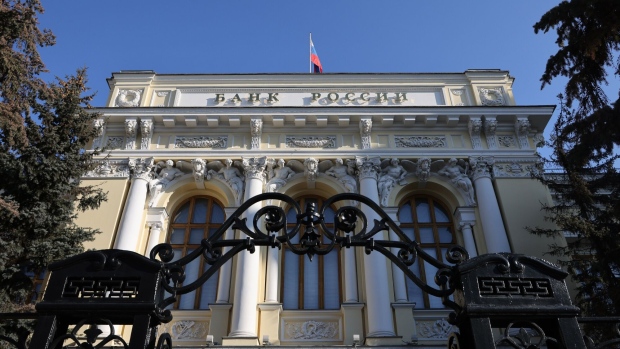May 31, 2024
G-7 to Target Banks Helping Russia Evade Ukraine War Sanctions
, Bloomberg News

(Bloomberg) -- Group of Seven nations and the European Union are studying ways to tighten the screws on banks that help Moscow evade sanctions.
Under consideration by some allies are measures that would target third-country lenders using the Bank of Russia’s SWIFT-like financial messaging system to circumvent trade restrictions, according to people familiar with the matter, who asked not to be identified as the discussions are private.
The discussions come ahead of a G-7 meeting in Italy next month, where government heads aim to agree on a set of measures to better enforce sanctions imposed on Russia for its war against Ukraine.
The G-7 has long made it a top priority to stop Russia from obtaining key technologies used in weapons or needed to produce them.
But Moscow has managed to skirt many of those restrictions by importing banned goods through third countries such as China, Turkey, the United Arab Emirates and nations in Central Asia, often via networks of intermediaries across multiple jurisdictions.
Read More: US Warns China of Coordinated Action Against Russian War Support
More recently, officials have focused on banks that have allegedly facilitated some of those transactions, warning them of new penalties. That’s prompted several lenders to tighten curbs and led to an apparent drop in Russian imports, some of the people said.
The Russian central bank recently flagged expanded restrictions and pressure on so-called friendly nations as a risk.
The US and its allies are “open to sanctioning” any company or individual helping Russia access components that can be used for weapons, US Deputy Treasury Secretary Wally Adeyemo told Bloomberg Television on Wednesday.
New EU Sanctions
As part of a new package of sanctions, the European Commission has proposed restrictions on lenders using the Russian central bank’s system for the transfer of financial messages, known as SPFS, to circumvent sanctions. Like SWIFT, it acts as a secure messaging network to facilitate interbank payments.
Use of the system nearly tripled last year compared with 2022. It’s now used by more than 150 foreign banks in some 20 countries including China, Belarus, Armenia, Tajikistan and Kazakhstan, one of the people said.
The EU is aiming to agree to the package ahead of the G-7 summit, but several EU member states have pushed back against a blanket ban on SPFS over concerns that such a move could impact legitimate transactions and harm relations with third countries, the person said.
Other measures under discussion include proposals to list third-country banks helping Russia evade sanctions, boost legal demands on companies to improve checks on their subsidiaries and supply chains, and designate more individuals and entities in third countries.
Still In Flux
The people cautioned that specific restrictions that might emerge from the G-7 summit were still in flux, and allies could each adopt different measures.
Still, the talks highlight the growing attention the G-7 is placing on the financial sector’s role in Russia’s ability to circumvent sanctions and procure critical military technologies.
After the full-scale invasion of Ukraine in 2022, several major Russian banks were cut off from SWIFT, the international payments system used by financial institutions globally to convey instructions enabling tens of millions of interbank transactions each day. The ban prompted Moscow to steer business toward SPFS, which was set up in 2014 after its illegal annexation of Crimea.
The US and its allies have also stepped up warnings to the financial sector to increase compliance with sanctions and shut down any efforts at evasion, or face penalties.
Separately, G-7 leaders in June are hoping to reach a political agreement on how to use the profits generated by frozen Russian sovereign assets to help Ukraine.
--With assistance from Jennifer Jacobs.
©2024 Bloomberg L.P.


